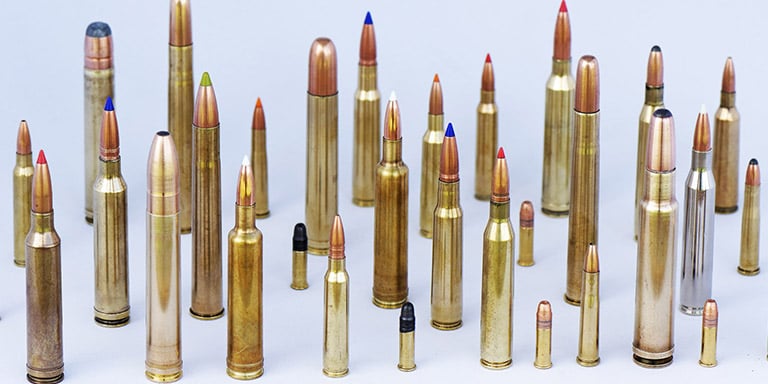About Ammunition Pro Llc
About Ammunition Pro Llc
Blog Article
Some Ideas on Ammunition Pro Llc You Should Know
Table of ContentsExcitement About Ammunition Pro LlcAmmunition Pro Llc Fundamentals ExplainedGetting The Ammunition Pro Llc To WorkTop Guidelines Of Ammunition Pro LlcGetting The Ammunition Pro Llc To Work
The standard parts of ammunition are the exact same for rifle, gun, and shotgun ammunition. Today we're looking at the what the basic components of ammo are and exactly how they work with each other to terminate a round.The bullet is seated in the open end of the situation. When you fire a bullet out of a semi-auto gun, the gun's extractor lifts the situation from the firing chamber and it flies out of the gun.
A weapon's firing pin strikes a cartridge's guide. The guide is a steel mug that holds an explosive chemical compound. When the firing pin strikes the guide cap, it crushes the priming compound against the anvil. This produces a tiny surge in case that sparks the propellant. The guide lies in the edge of the instance of a rimfire cartridge.
Our Ammunition Pro Llc Statements
Gunpowder following to the instance that usually includes it. It is usually a mixture of saltpeter, charcoal, and sulfur.

We call the projectiles for shotshells, which we fire via shotguns, slugs and shot. A slug is one strong item, usually made out of lead. Shot is a group of pellets constructed of lead, steel, bismuth, or tungsten alloy. Shot pellets can be available in various dimensions and quantities. Currently that you have a basic understanding of the fundamental components of ammo, you can really feel a little more certain in how your gun and ammo function!.
See This Report on Ammunition Pro Llc
Stay on top of Special Deals, Advance Notice of Sales, and Store Occasions
Enjoyable truth: Grains are used to define the mass of a bullet because right back in the early days of weapons, it was a dispenser's device of measurement, and a common denominator was required to figure out how much cause make use of to make cast lead bullets (Gun Ammo). 'Grains' as a device of step for weight goes all the method back to ancient times, and represents the weight of a grain of wheat

(http://www.localzz360.com/directory/listingdisplay.aspx?lid=82519)For reference, the weight of a paper clip has to do with 16 gr. So, we understand that grains are an action of mass, and more = much heavier, and heavy is great, appropriate? Yes, heavy is good, but mass of the projectile isn't the only thing you require to think about when picking a round for your weapon.
Not known Details About Ammunition Pro Llc
This spin is produced by grooves cut or inculcated the inside of the barrel, which are referred to as 'gunning'. Fun fact, this is the origin of the term "Rifle" ex lover. A rifled musket vs. smoothbore musket. The effect this spin has on projectiles is a supporting one the bullet revolving maintains the nose pointed straight, similarly that a flawlessly spiraled football throw is going to be a lot more stable and exact in trip than a hideous duck, end over end toss.
How does this relate to grain weight? Imagine you're on one of those playground carousels, the ones with bars you hold on to while it rotates.
The very same result happens with bullets. The larger the projectile, the more effect a faster rotate will have on it.
Ammunition Pro Llc for Beginners
However there's an additional factor that we need to take into consideration when choosing a grain weight for our ammunition. As meant above, bullet velocity, or the rate of the projectile, is a significant aspect when determining the ideal grain weight projectile to make use of. Speed is affected by a couple of significant elements, consisting of the type and quantity of propellant (gunpowder), barrel size, and bullet weight.

The most usual grain weight rounds for 9x19mm cartridges are 115gr and 124gr. These are commonly lead core, completely jacketed (FMJ) rounds. Both of these grain weight cartridges will execute well in factory 9mm hand guns, to typical gun distances (approximately 50 backyards). 115 grain rounds are the most typical (and as a result least pricey).
Report this page